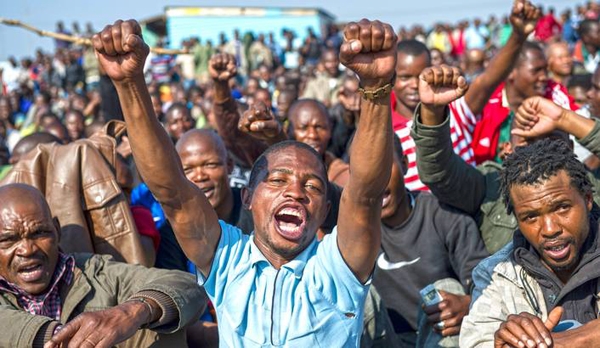Lonmin’s Bermuda Triangle

Platinum mining giant Lonmin could have found the money to meet rock drillers’ pay demands instead of shifting funds between subsidiaries, possibly to avoid tax.
These are the conclusions of a detailed analysis of Lonmin accounts by economist Dick Forslund of the Alternative Information and Development Centre in Cape Town.
Forslund revealed his findings at a press conference on October 16 after an earlier press conference, planned for last week in Johannesburg, was cancelled after Lonmin intervened to block it.
Forslund found that huge “sales commissions” had been paid between 2007 and 2012 by Lonmin’s main operating companies, Western Platinum and Eastern Platinum, to a subsidiary, Western Metal Sales, in Bermuda, and that “management fees” had been paid to its own head office in SA. Together the two arrangements came to well over R400 million a year.
Presenting the report to the Cape Town Press Club, Forslund said the analysis showed that Lonmin had brought the violent wage protests, which led to the massacre of 34 miners in August 2012, on itself.
“On the basis of these transfer pricing arrangements, we conclude that Lonmin could have acted differently before 2012 in terms of wage demands and can act differently today”.
In total the company had transferred R1.5 billion in “sales commissions” and a further R1.4 billion in “management fees”, he said.
Transfer pricing of this sort is often used to avoid tax.
There is no company or income tax in Bermuda. In South Africa the rate of company tax is 28%.
Forslund said the money transferred to Bermuda could have added between R3,500 and R4,000 a month to the rock drillers’ wages. If money transferred to head office in “management fees” was also taken into account, the sum added to rock drillers’ wages could have been roughly R7,000 a month between 2010 and 2012 - even though these were not the years of the platinum boom.
“‘Affordability’ is very much about choosing what to afford,” he said. “Lonmin Plc has chosen and chose in 2012 to afford two profit shifting arrangements, together costing mine workers, mining communities and South Africa well over R400 million per year - instead of affording what unfolding events ever since 2011 have proven necessary to afford.”
The analysis is based on material made public through the Marikana Commission and on financial statements.
Forslund said transfer pricing was “deeply ingrained” in the business community operating in South Africa. Asked about measures to prevent it, he said this could worsen the investment climate.
“Presumably, the possibility of this practice is factored into investment assessments of companies. To legislate the practice would be seen as a hostile act by investors.”
Last week Lonmin went to court to stop the AIDC from publishing the material, which the company argued would undermine the Commission hearings and could rekindle “the very unrest which led to the unfortunate events at Marikana” in 2012.
The AIDC agreed to postpone the planned press conference, to give Lonmin notice of a new press conference and to provide a summary of the content ahead of time. Informed two days ago of the press conference, Lonmin again objected but did not attempt to stop publication of the report, though the company’s lawyers have claimed it is “defamatory”.
In a statement today Lonmin described the report as “misleading” and accused the AIDC of undermining the work of the Farlam Commission.
See article published on 10 October 2014 here.
Support independent journalism
Donate using Payfast


This article is licensed under a Creative Commons Attribution-NoDerivatives 4.0 International License.
